新目标大学英语1unit4 Language in Use
- 格式:pptx
- 大小:2.41 MB
- 文档页数:29
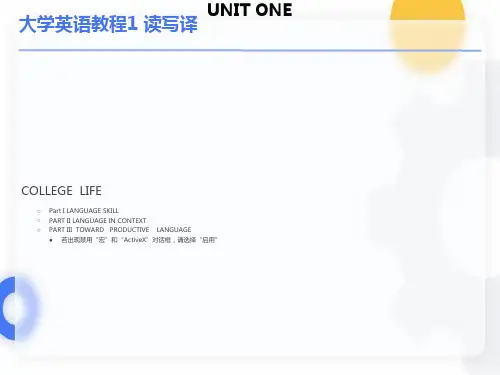
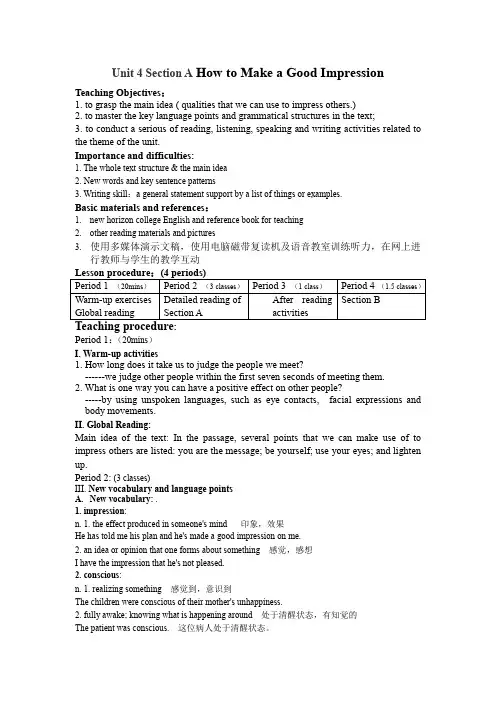
Unit 4 Section A How to Make a Good Impression Teaching Objectives:1. to grasp the main idea ( qualities that we can use to impress others.)2. to master the key language points and grammatical structures in the text;3. to conduct a serious of reading, listening, speaking and writing activities related to the theme of the unit.Importance and difficulties:1. The whole text structure & the main idea2. New words and key sentence patterns3. Writing skill:a general statement support by a list of things or examples.Basic materials and references:1.new horizon college English and reference book for teaching2.other reading materials and pictures3.使用多媒体演示文稿,使用电脑磁带复读机及语音教室训练听力,在网上进行教师与学生的教学互动Lesson procedure:(4 periods)Period 1 (20mins)Period 2 (3 classes)Period 3 (1 class)Period 4 (1.5 classes)Warm-up exercises Global reading Detailed reading ofSection AAfter readingactivitiesSection BTeaching procedure:Period 1:(20mins)I. Warm-up activities1. How long does it take us to judge the people we meet?------we judge other people within the first seven seconds of meeting them.2. What is one way you can have a positive effect on other people?-----by using unspoken languages, such as eye contacts, facial expressions and body movements.II. Global Reading:Main idea of the text: In the passage, several points that we can make use of to impress others are listed: you are the message; be yourself; use your eyes; and lighten up.Period 2: (3 classes)III. New vocabulary and language pointsA.New vocabulary: .1. impression:n. 1. the effect produced in someone's mind 印象,效果He has told me his plan and he's made a good impression on me.2. an idea or opinion that one forms about something 感觉,感想I have the impression that he's not pleased.2. conscious:n. 1. realizing something 感觉到,意识到The children were conscious of their mother's unhappiness.2. fully awake; knowing what is happening around 处于清醒状态,有知觉的The patient was conscious. 这位病人处于清醒状态。
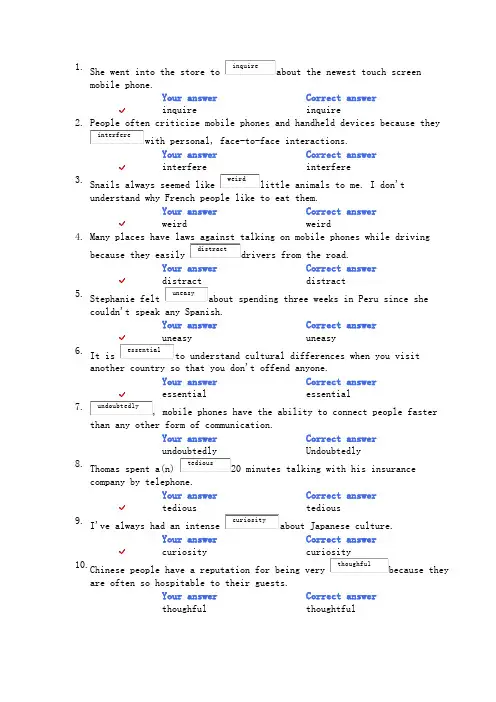
1.mobile phone.Your answer Correct answerinquire inquireYour answer Correct answerinterfere interfere3.understand why French people like to eat them.Your answer Correct answerweird weird4. MYour answer Correct answerdistract5.couldn't speak any Spanish.Your answer Correct answeruneasy6.another country so that you don't offend anyone.Your answer Correct answeressential essential7.than any other form of communication.Your answer Correct answerUndoubtedly8.company by telephone.Your answer Correct answertedious tedious9.Your answer Correct answercuriosity10.are often so hospitable to their guests.Your answer Correct answerthoughful thoughtfulSection B: Choose the best way to complete the sentences.11. He didn't understand the _______ his attitude had oneveryone's opinion of him.A. impactB. extentC. impulseD. excuse12. Let's strive to eliminate any further _______ byhaving open communication.A. confuseB. confusedC. confusionD. confusing13. To me, life without telephones and email would be a_______ existence indeed!A. solitudeB. soloC. solitaireD. solitary14. In South Africa, it's very common for guests to dropby a friend's house unannounced, _______ in England, this might be considered rude.A. whereasB. whereC. thatD. which15. I couldn't even begin to _______ why she behaved sobadly.A. knowC. recognizeD. assume16. I offered to shake his hand on _______; I forgot thatthis is not normal in Japan.A. impulseB. repulsiveC. repulseD. impulsive17. Sonia read _______ every book on Germany beforevisiting last summer.A. necessarilyB. completelyC. practicallyD. undoubtedly18. It's interesting to see how different cultures _______certain hand gestures.A. understandB. distinguishC. perceiveD. appreciate19. We weren't allowed to _______ a word while working atthe library.A. utteranceB. utterC. utteringD. utters20. My supervisor has absolutely no _______ for rude ordisrespectful behavior.B. appreciationC. confusionD. recognitionSection C: Complete each sentence with a suitable word.21.solutions.Your answer Correct answerbeyond beyond22.from Australia.Your answer Correct answerover over23.job.Your answer Correct answerto to24.for actions on climate change.Your answer Correct answerOn25.doing.Your answer Correct answeron on26.Your answer Correct answeroff27.Your answer Correct answerover28.Your answer Correct answerof29.eating out.Your answer Correct answerof of30.mediation.Your answer Correct answerto toPart II: Banked ClozeQuestions 31 to 40 are based on the following passage.It seems like most people today have a mobile phone (31)permanently attached to their hands. Surprisingly, many of these people don'ta(n) (32)(33)would be lost without the ability to send text messages.I'm not against new technologies, but I personally find text messaging very(34)talk to that person on the phone and immediately hear his (35)much (36)Most text messages (37)complete sentences. They resemble a(n) (38)with messages like, "gr8! c u 2nite!" I think it's about time people stoppedletting text messages (39)thoughts. Together, we can (40)each other using real, spoken words!Your answer Correct answer(31) handset(32) essential(33) lifestyle(34) distracting(35) response(36) confusion(37) generally(38) weird(39) interfere(40) rediscoverPart III: Reading ComprehensionQuestions 41 to 45 are based on the following passage.Now that I've graduated from college and moved into my own apartment, my parents often make a fuss about how scattered our family has become. I was their last child to move away from home, and I think they often miss having everyone together in one place. I can certainly understand their point. They still live in Birmingham, but I now live in London and my sister is attending university in Oxford. To make matters worse, my older brother recently moved to Spain for a job.Of course, we all keep in touch through email and over the phone. My brother even keeps a daily blog! However, it's not the same as being together, and sharing important news over email is completely different from telling someone that news face to face. We do our best to touch base with each other at least every other day, but we're all busy and sometimes we forget.The holidays are my favourite time of the year because it's when we all come together at our old house. With everyone together and in one place, it feels just like old times. I really enjoy spending time with my brother and sister and I know my parents really appreciate having all the kids under one roof again.My parents don't have Internet access at their house and my mother has arule that we all must switch off our mobile phones while we're there. If we want to make a call, we must go outside! It may sound harsh, but it really helps to bring all of us together. It's easy to forget how important and special personal connections can be. I think that modern technology, for all of its allure, interferes with the development of genuine relationships.41. With which of the following statements would theauthor probably agree?A. Email is a great substitute for personalconversations.B. Keeping a daily blog is a great way to keepin touch with friends and family.C. Face-to-face conversation is the best formof communication.D. The best way to share news with someone isover the phone.42. What is the main idea of this passage?A. Parents enjoy having their family togetherin one place.B. There is a difference between sharing newsthrough email and face to face.C. The holidays are the best time of the year.D. Genuine relationships are best developedthrough personal communication.43. Where would this passage likely appear?A. In a scientific journal.B. In a personal memoir.C. In an academic paper.D. In a technical report.44. Which of the following best describes "under one roof"(Para. 3, Line 3)?A. In the same house.B. Safe from danger.C. Out of the weather.D. In the same country.45. Why does the author like the holidays so much?A. He likes to eat home-cooked meals.B. He likes to have free time to surf the Internet.C. He likes to spend time with his family.D. He likes to have phone calls outside.。
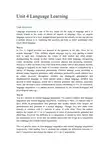
Unit4Language LearningUnit overviewLanguage acquisition is one of the key issues for the study of language and it is closely related to the study of almost all aspects of language.How we acquire language seems to be a most straightforward question but actually no one can provide a definite answer to it.Exploring this question can help us better understand other issues about language.Text AIn Text A,Napoli provides two answers to the question in the title,“How do we acquire language?”.First,children acquire language step by step,gaining a certain skill in each step:recognizing the voices of their mother and other people, distinguishing the sounds of their mother tongue from other language,recognizing words,producing words,producing two-word phrases and producing sentences. However,it does not mean every individual child exactly follows this pattern.Second, language is acquired on the basis of Universal Grammar,which is exemplified by a variety of language acquisition phenomena:Children arrange words according to abstract innate linguistic principles;early utterances produced by small children have an innate structure;immigrants’children can distinguish grammatical and ungrammatical language us;while parents speak a pidgin language,children may develop a creole language,which has a coherent grammar;and children,especially twins,can develop a secret communication system conforming to UG.In conclusion, language acquisition is a natural process determined by the human biological and physiological make-up.Text BText B is focused on second language acquisition.The authors compare first language acquisition and second language acquisition.According to them,L2learners tend to have errors in pronunciation and grammar and usually cannot fully acquire the pronunciation and grammar of a second language.Though,they also share some features in common with L1learners in terms of work order.Then,the authors analyze the impact of L1on L2acquisition in terms of pronunciation,grammar and phonology.However,the difficulty in L2acquisition is caused by more factors than the interference of L1.In the end,the authors discuss the role of age in L2acquisition and challenges the Critical Period Hypothesis.The two articles focus on first language acquisition and second language acquisition respectively.After reading Text A,students can compare the differences between L1 and L2acquisition and discuss the impact of L1on L2acquisition.Teaching objectivesReading skills●Summarize the main idea of each paragraph●Identify topic sentences and key words●Identify supporting detailsCommunicative competence●Illustrate your points with appropriate examples●Use topic sentences and supporting sentences to organize your presentation/essay ●Use euphemisms for possibly impolite expressionsCritical thinking●Use different examples to support different aspects of an idea●Use observation and literature to collect first-hand and second-hand evidence●Critique a“popular”folk theory with exemplification and reasoning Intercultural competence●Be aware of the differences and similarities between English and Chineseeuphemisms●Compare the Chinese language and the English language in terms of L1and L2learning●Understand the effects of cultural differences on communication and languagelearningTeaching strategiesYou can arouse the students’interest in this topic by showing them the Nature vs. Nurture debate,which is controversial in not only language acquisition but also psychology,education,law and popular culture.There is no definite answer to this debate but every student may have his or her own answer.After learning this unit, they will get new evidence or examples to support their answer or they may simply change their view.For a detailed description of child language acquisition,you can refer to Chapter8in Towards an Understanding of Language and Linguistics(《语言学概论》)by Lan Chun.Other resources include:●A general introduction/language.html●Emphasis on nature vs.emphasis on experience/news/special_reports/linguistics/learn.jsp●Language acquisition nguage learning/inservices/language_acquisiti_vs_language_02033.phpPreparatory work(1)Language Matters:A Guide to Everyday Questions About LanguageThis activity aims to arouse students’interest in other everyday questions about language which they often take for granted.They can also learn to search for an academic monograph on the Internet.The twelve questions answered by the author in the book are:●Question1:How do we acquire language?●Question2:From one language to the next:Why is it hard to learn a secondlanguage?Why is translation so difficult?●Question3:Does language equal thought?●Question4:Are sign languages real languages?●Question5:Do animals have language?●Question6:Can computers learn language?●Question7:Whose speech is better?●Question8:Why do dialects and creoles differ from standard language?●Question9:Do men and women speak differently?And who cares?●Question10:English spelling is hard,and it makes learning to read hard.Shouldwe do anything about it?●Question11:Should the United States adopt English as our official language andoverhaul our educational system accordingly?●Question12:Does exposure to and use of offensive language harm children?The book can be found on ,which also provides the second edition of the book with15questions about language.(2)Small children learning languageThis activity provides an opportunity for students to reflect on their personal experiences of learning language and collect some real examples of language learning, which can be analyzed during the reading of Text A.Relevant cases can also be found on the Internet,for example:/s?__biz=MzA5MzUxNTQ3Nw==&mid=206097261&id x=1&sn=ff8cb7a4119c131e3773e9f7d58d2fa6#rd(3)Universal GrammarThis activity is of great importance for understanding the second part of Text A. Definition:Universal Grammar proposes that the ability to learn grammar andlanguage is hard-wired into the brain.It is shared by all human languages.Chomsky argued that the human brain contains a limited set of rules for organizing language. Key publications of Chomsky:●Syntactic Structures,London:Mouton,1957.●Current Issues in Linguistic Theory,The Hague:Mouton,1964.●Aspects of the Theory of Syntax,Cambridge:M.I.T.Press,1965.●Language and Mind,New York:Harcourt,Brace&World,1968.●Studies on Semantics in Generative Grammar,The Hague:Mouton,1972.●The Logical Structure of Linguistic Theory,New York:Plenum Press,1975.●Lectures on Government and Binding:The Pisa Lectures,Dordrecht,Holland:Foris Publications,1982.●Some Concepts and Consequences of the Theory of Government and Binding,Cambridge:M.I.T.Press,1982.●Language and Thought,Wakefield,RI:Moyer Bell,1993.●The Generative Enterprise Revisited:Discussions with Riny Huybregts,Henkvan Riemsdijk,Naoki Fukui,and Mihoko Zushi,with a new foreword by Noam Chomsky,Berlin:Mouton de Gruyter,2004.For more information about Chomsky,please refer to the following website: /index.htm(4)Types of languageThis activity provides background information necessary for understanding different kinds of language mentioned by Napoli in Text A.Motherese/baby talk(Paragraph7):It is a nonstandard form of speech used by adults in talking to toddlers and infants.It features high pitch and special vocabulary,e.g. doggy for dog(Para.10),daddy for dad(Para.10),kitty for cat and wawa for water.A feature of baby talk in Chinese is reduplication,e.g.喝水水and吃饭饭。

---------------------------------------------------------------最新资料推荐------------------------------------------------------新视野大学英语(第三版)第一册Unit4课后练习答案新视野大学英语(第三版)第一册第四单元课后练习答案Language focus Words in use 3 1 involve 5 circumstances 9 reconciled Word building 4 Words learned -able agree apply desire sustain compare -ance accept attend assist acceptance attendance assistance agreeable applicable desirable sustainable comparable new words formed 2 fulfilled 6 respond 3 intense 7 subsequent 4 advocate 8 confined10 distinct1/ 8-ment entertainment assignment engage entertain assign engangement5 1 assistance 5 applicable 9 agreeable Banked cloze 6 1L 8K 2N 9A 3J 10 E 4F 5M 6C 7H 2 comparable 6 assigned 10 sustainable 3 attendance 7 acceptance 4 engagement 8 entertain11 desirableExpressions in use 7 1 shield…from 5 are/ get caught up in 8 count on 2 make sense of 6 relate to 3 called on 7 sum up 4 in need9 In her words10 reserved forStructure analysis and writing 8 Question:---------------------------------------------------------------最新资料推荐------------------------------------------------------ Some first responders do not succeed in helping others and they get injured or die in their efforts. Do these people become heroes because of what happens to them as they try to help others-instead of what they actually make happen?(Para. 9) Example: Ms. McMahon was the founder of a cycling association. Her husband was a police officer who was killed in an off-duty bicying accident. Ms.McMahon thought that Sgt. Russell was indeed a hero because he showed distinct courage when trying hard in a heavy snowstorm to stop the snowplow before it hurt others. She summed up that it’s natural for most people to rush toward safety and away from danger. Heroes, however, rush toward danger to help those in need. (Paras. 10-11) Conclusion: We expect first responders to rush forward in times of danger. So when they die doing that, we should recognoize their heroic action even though we ourselves may not be that brave. (Para.12)Structured writing 9 Where does happiness come from? Ann wasa full-time worker with a low income, but she devoted a lot of her time to helping people in her community. One day, Ann was diagnosed with a severe heart disease,but3/ 8she did not have enough money for treatment. When people in her community heard the news, they raised money for her and helped take care of her children. Although Ann was very sick, she felt very happy. She had enjoyed helping other people, who now in turn were happy to help her. Happiness is indeed the result of helping each other.Translation 10 作为通过中国游历亚洲的首批欧洲人之一,马可·波罗可能是中国人最熟知的外国商人和航海家。

新目标大学英语综合教程4New Target is a comprehensive university English course designed to help non-native English speakers improve their overall English communication skills. The course consists of four levels, each level focusing on different aspects of English language learning, including listening, speaking, reading, and writing.In the first level of the course, students work on developing their listening skills. They are introduced to various listening activities, such as listening to conversations, lectures, and interviews. These activities help students improve their ability to understand spoken English, including different accents and speech patterns. The listening texts are based on real-life situations and cover a wide range of topics, from everyday conversations to academic lectures. In addition to listening activities, students also learn about different listening strategies, such as predicting content, taking notes, and summarizing information.The second level of the course focuses on speaking skills. Students are provided with opportunities to practice speaking in different contexts, such as giving presentations, participating in group discussions, and engaging in role plays. Through these activities, students enhance their speaking fluency, accuracy, and confidence. They also receive feedback from their teachers and peers to help them identify areas for improvement. The speaking topics cover a wide range of subjects, allowing students to express their opinions and ideas effectively.Developing reading skills is the main focus of the third level of the course. Students learn various reading strategies, such as skimming,scanning, and predicting, to improve their reading speed and comprehension. They are exposed to a wide range of reading texts, including newspaper articles, short stories, and academic essays. These texts help students expand their vocabulary, improve their reading comprehension, and develop critical thinking skills. The reading passages are followed by comprehension questions and activities to test students' understanding of the texts and encourage them to think critically about the content.Finally, the fourth level of the course is dedicated to writing skills. Students learn different writing techniques, such as brainstorming, outlining, and editing, to help them effectively express their ideas in writing. They are introduced to various types of writing, such as essays, reports, and letters, and practice writing on different topics. Through the writing activities, students improve their grammar, vocabulary, and sentence structure. They also learn how to organize their ideas logically and coherently. Besides writing independently, students also engage in peer editing and receive feedback from their teachers to further improve their writing skills.Throughout the course, students are provided with ample opportunities to practice their English language skills both inside and outside the classroom. They are encouraged to engage in meaningful conversations, read extensively, listen to English podcasts or videos, and write regularly. The course materials are designed to be engaging and relevant to students' interests and needs, making the learning process enjoyable and effective.In conclusion, New Target is a comprehensive university English course that covers all aspects of English language learning,including listening, speaking, reading, and writing. By focusing on different skills at each level, the course helps non-native English speakers improve their overall English communication skills and become more confident and proficient in using the English language.。
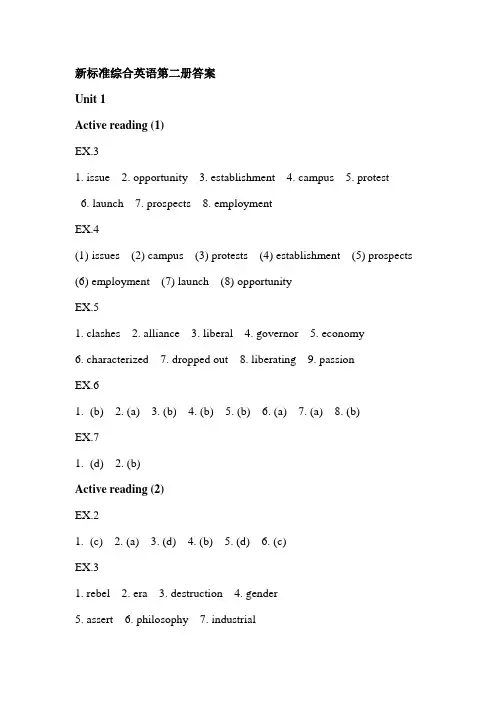
新标准综合英语第二册答案Unit 1Active reading (1)EX.31. issue2. opportunity3. establishment4. campus5. protest6. launch7. prospects8. employmentEX.4(1)issues (2) campus (3) protests (4) establishment (5) prospects (6) employment (7) launch (8) opportunityEX.51. clashes2. alliance3. liberal4. governor5. economy6. characterized7. dropped out8. liberating9. passionEX.61.(b)2. (a)3. (b)4. (b)5. (b)6. (a)7. (a)8. (b)EX.71.(d)2. (b)Active reading (2)EX.21.(c)2. (a)3. (d)4. (b)5. (d)6. (c)EX.31. rebel2. era3. destruction4. gender5. assert6. philosophy7. industrialEX.4(1) rebel (2) assert (3) era (4) industrial (5) philosophy(6) gender (7) destructionEX.51.(a)2. (a)3. (a)4. (a)5. (b)6. (a)7. (b)8. (b)EX.61.critical2. critical3. critical4. critical or approving5. critical or approving6. approvingEX.71.(b)2. (b)Language in useEX.21.The world has changed a lot since the 1960s, and so have universities.2.I really enjoyed my years at university, and so did Jackie.3.Choosing the right course is always a major problem for new students,and so is organizing one’s time on campus.4.I’m thinking of going to the lecture on post-colonial literature, and sois Li Ming.5.I think the facilities in our college have improved over the last fewyears, and so has the teaching.6.We can access the Internet in our student hostel, and so can everyoneelse on campus.1.I’m not very interested in politics, nor are my friends.2.I won’t be doing much tonight, nor will my roommate.EX.31.Starting out at college means meeting lots of interesting people.2.Going to bed too late means not being able to concentrate the next day.3.Doing a course in Lit Theory means spending a lot of time on difficultsubjects.4.Being interested in literature means having an open mind about otherways of life.5.Protesting against the Vietnam War in the 1960s meant going out ontothe streets.6.Going to college today means spending a lot of time thinking aboutwhat you will do afterwards.EX.51.Instead of resolving contradictions, the series of measures taken by thegovernment gave rise to more violent clashes. The Opposition formed an alliance with the trade unions and launched a general strike, which ultimately brought about the downfall of the government.2.Nowadays, the gap between the university and the real world isshrinking and students are becoming more and more practical. Gone are the days when the university was an ivory tower in which scholarspursued knowledge as an end rather than a means to an end.3.I never hoped to learn the subject well by attending those lectures. ButI did go to lectures, for it was the place where I could get theimportant points of the course and learn how to organize materials and how to reason.4.Although I have been trying every means to solve the problem, Icannot work out a satisfactory solution. But when I went to the kitchen to get a drink, something clicked and made me realize that the solution might be quite simple.Write a short passage about the early years of your college or university.Set the context.My university dates from …Introduce the main focus.It soon became …Expand the information in the previous sentence.It had …Add an interesting detail.The most interesting thing abou t my university …Say what happened at a particular moment in the university’shistory.At that time, my university …Write a conclusion.Today my university is one of the …GW: TipsFind out history and stories of your university.Use the guide on your book to start your sentences, but please addyour sentences to expand the writing whenever there is an opportunity.Delete one or two words if necessary and modify the tense givento get your sentences fit with the meaning and context.GW: Sample1. Set the contextMy university dates from 1931 as a provincial education college.2. Expand the information in the previous sentenceIt became a state teachers’ college in 1944 with its main focus on training teachers. It had trained many teachers for all over the province, because the country then needed teachers to offer education to children and adult learners.3. Add an interesting detailThe most interesting thing about my university is that it was said that the founder of China’s geomechanics Prof.Li Siguang (李四光1889–1971) was the person who persuaded the authorities to change the university from an education college to a teacher training college, eventhough he did not have an official position at the university.4. Say what happened at a particul ar moment in the university’s historyAt that time, my university only had a few departments with limited resources. Later after 1949, the university expanded with its graduates working in different professions although its main focus was still to train teachers.5. Write a conclusionToday my university is one of the key comprehensive universities offering courses from undergraduate to doctoral degrees to over 18,000 students, producing qualified teachers as well as engineers, lawyers, scientists, mathematicians, economists and management professionals.Unit 2Active reading (1)EX.41. stroke2. crawl3. imitate4. pat(a) patted (b) imitating (c) crawl (d) strokingEX.51. distinct2. infants3. sympathetic4. stem from5. trace\discipline6. overall\distressEX.61. (a)2. (a)3. (a)4. (a)5. (b)6. (b)7. (a)8. (a)9. (b) EX.71. 3. 5. 7.Active reading (2)EX.31.(c)2. (b)3. (b)4. (d)5. (c)6. (c)7. (b)8. (c)EX.41. honorable2. drama3. beam4. catalog5. volume6. knot7. couch8. clip9. mostlyEX.5(1) honorable (2) beam (3) mostly (4) catalog (5) clip(6) knot (7) couch (8) volume (9) dramaEX.61.(b)2. (a)3. (a)4. (a)5. (b)6. (a)7. (a)8. (b)9. (a)Language in useEX.11.immigrants2. contestants3. vacancies4. consultancy5. defendant6. hesitancy7. attendant8. pregnancy9. assistantEX.21.You misunderstand it.2.You have misplaced it.3.It is misfortune.4.You have made a misjudgement.5.You have been misinformed about it.EX.31.By the time I arrived at the party, almost everyone had already left.2.By the time children are two, they have known about 100 words.3.By the time he realized what was happening, it had been too late toask for help.4.By the time I finally got my degree, most of my friends already hadjobs.5.By the time they leave primary school, children have learnt a lot ofuseful skills.6.By the time Courtney finished writing the essay, the deadline hadalready passed.EX.41.The old man shouted at me, as if / as though it were me who had madethe mistake.2.The girl started crying, as if / as though it were she who had fallenover.3.Lucy stood at the door welcoming everyone, as if / as though it wereher party.4.Sylvia closed the door of David’s room, as if / as though it were himthat was making the noise.EX.61.The moment I saw those old photos in the drawer, tears welled up inmy eyes, for my memory went back to the days when I lived happily with my grandparents, my parents and my brothers and sisters.2.When a student slipped on a pool of water and fell over, people’sreaction diverged from one another. Some approached caringly to see if he was hurt and if they could help; some just stood there confusing over what to do about it; while others just tuned out.st Saturday morning, I did the usual and went shopping in thesupermarket. When I was about to open the door of my car, I found that I did not have my wallet on me. I could do nothing but go back home in search of it, but I failed to find it anywhere.4.When I was a second grader, one of my classmates got a redradio-controlled toy car as a birthday gift. The rest of us could only admire, but could not imitate, because the car was expensive and was bought in Hong Kong, a place which seemed to us as far away as New York at that time.。

新闻头条世界各地的媒体都以头条报道同一新闻的情形并不很常见。
这样的事件得具有巨大的国际影响力。
但是这正是2001年9月恐怖分子袭击纽约世贸中心双塔之后发生的情形。
从那一刻起世界改变了模样,这样说也许并不夸张。
但是,使9/11值得纪念并(用媒体喜欢的话来说)具有新闻价值的不仅仅是它的历史性和国际性。
还有震惊和恐惧。
这一消息极度震撼,极具爆炸性。
事发多年以后,许多人还能清楚地记得他们第一次听到这一消息时身在何处、当时正在做什么。
他们能记得自己的反应:对世界各地的许多人来说,他们的第一本能是去把这一消息告诉别人。
这就证实了那句老话:“坏事传千里”。
一切重大新闻都是如此。
我记得上小学的时候,老师脸色煞白地向一班吃惊的七岁孩子通报说,肯尼迪总统死了。
我并不知道肯尼迪总统是谁,但是我听到这一消息后非常不安,后来就跑回家去告诉了父母(当然,他们已经知道了)。
事实上,这是我最早的记忆之一。
那么,新闻到底是什么?一个事件光有客观重要性显然还不够——世界上有大量全球性的大问题,都会造成戏剧性的后果,从贫困问题到全球变暖问题——但由于它们都是进行中的,并不都会在同一天成为头条。
对比之下,9/11不仅具有国际性,而且奇特怪异、出人意料,还(可能使读者对身陷那场悲剧中的人们的痛苦感同身受,从这个意义上讲)极具人性。
奇特怪异并不意味着重大。
就拿今天的《中国日报》上关于一只老鼠延误了一架从越南飞至日本的航班这条消息为例吧。
在河内机场有人发现那只老鼠在一架飞机的过道里奔跑。
它最终被12名技术人员合力逮住,他们怕它会咬破电线,造成短路。
飞机晚点了四个多小时才起飞。
你也许会说,这并不是具有重大国际影响的事件(除了少数乘客到另一国赴约迟到以外)。
但是全球却颇有反响,从亚洲经苏格兰到美洲的电子版报纸都有转载(《爱丁堡晚报》的标题是《捉老鼠延误航班》)。
新闻价值的另一个元素是即时性。
这是指事件发生的时间近。
一周前发生的事件一般来说就不是新闻了——除非你刚刚读到它。
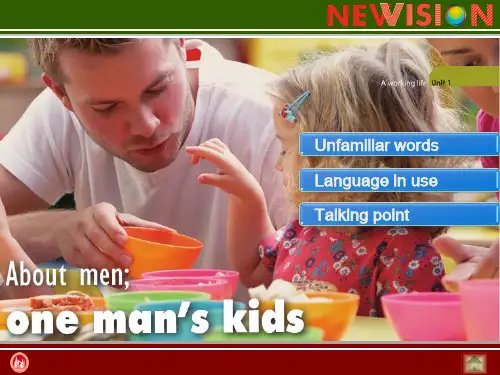
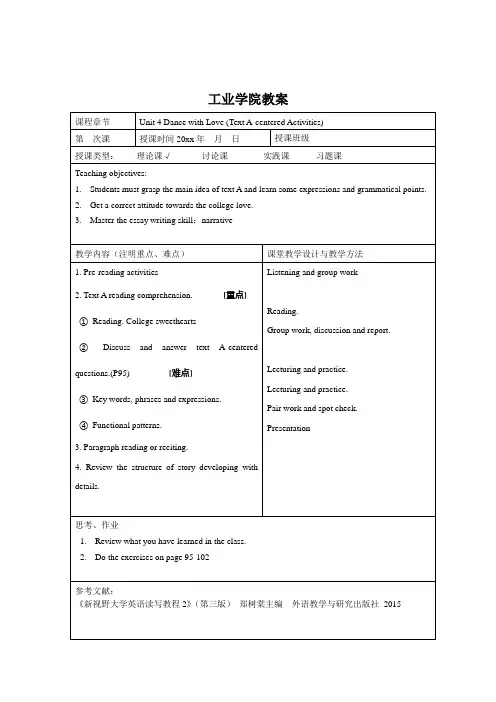
工业学院教案Unit 4说写课(第1次课)The first 50 minutes:Step1: Pre-reading activities. (10 minutes)1.Lead-in.2.Do the pre-reading activities on page 88.Step 2: Text A reading comprehension.1.Ask the students to read Text A within 10 minutes.2.Divide the class into groups to discuss and find answers to questions on page 95:understanding the text and critical thinking (for critical thinking questions, the teacher had better ask the students to choose only one or two to discuss). While the students are discussing, the teacher may walk around and offer some help.Then, ask one or two students to report their discussion results. (30 minutes) The second 50 minutes:Step3: Key words, phrases and expressions. (15 minutes)Use the following patterns to make sentences.1. Sth.(a feeling) comes over sb. when sb. does sth..(Para.3)用于表达“某人在特定情境下突然受到某种情感的影响”。
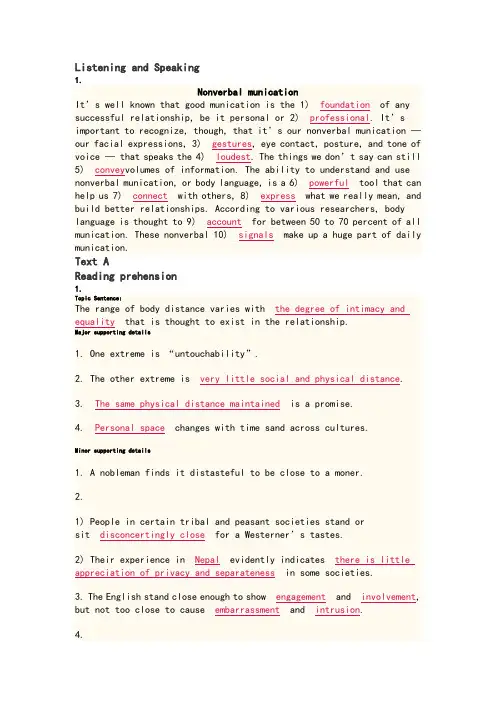
Listening and SpeakingReading prehension3.Key for reference2) Cultural misunderstandings can occur when people don’t share or understand the rules of a particular culture. The rules of how you behave are to do with what people expect you to do in certain situations. People can learn the rules of a new culture by watching people and through asking questions. It is cultural values that lead to expectations and rules about how people behave.Language in Use∙1) symbolize∙2) involved∙3) appreciates ∙4) extend∙5) engaging∙6) embarrassed ∙7) intimate∙8) associations ∙9) equality∙10) threatened5.∙1) stretch out∙2) vary with∙3) associate with∙4) drop in∙5) ment on∙6) fended off∙1) physical distance∙2) long distance∙3) personal space∙4) living space∙5) current situation∙6) walking distance∙7) parking space∙8) financial situation7.∙1) check-in∙2) feedback∙3) update∙4) sweetheart∙5) crossroad∙6) earthquake∙7) highlight∙8) real estate8.Reference translation1) 人和人之间的身体距离因其关系亲疏和地位高低而不同。
Listening and Speaking● He was a German-born Jewish theoretical physicist.● He proposed the Theory of Relativity and also made majorcontributions to the development of quantum mechanics.● He was awarded the 1921 Nobel Prize for Physics.● He loved music.● He became a US citizen in 1940.● He was offered, but turned down, the Presidency of the State ofIsrael.Text AReading prehension1.•1) b•2) c•3) a•4) e•5) f•6) d•7) j•8) g•9) h•10) i2.A. Einstein’s academic popularity:1) There is no other personality in the academic world that has evenhalf Einstein’s popularity.2) There is no genius in the world as respected and as loved asAlbert Einstein.3) Nowhere in the world could we find another academic that rivalsthe popularity of rock superstars.4) His opus “E=mc2” would rival any Beatles’ platinum record.5) His “Theory of Relativity” even shook Newton’s gravitationaltheory off the charts.B. Einstein’s love of and gift for music:1) Had he lived later, he could easily pass as the only male memberof the Bond electric Quartet.2) Had he not been a scientist, he would have been a musician.3) Einstein, with unclipped moustache and unkempt hair, didactually perform in solo concerts!4) Einstein shone in a deeply felt performance of an adagio from oneof the Beethoven sonatas before his 17th birthday.5) In addition to his prowess on the violin, he also played the pianoand, in particular, loved to improvise.C. Einstein’s gift brought out by music:1) Albert Einstein believed that he got most joy in life out ofmusic.2) Albert Einstein himself admitted that the reason he was so smartwas because he played the violin.3) One friend, G. J. Withrow, confided that the way Einstein dealtwith problems and equations was by improvising on the violin.4) Einstein’s second wife, Elsa said that music helped him when hewas thinking about his theories.5) His son Hans said that Albert Einstein took refuge in music,which would usually resolve all his difficulties.Reading and Discussing3.For reference1) Albert Einstein himself admitted that the reason he was so smartwas because he played the violin. One friend, G. J. Withrow, confided that the way Einstein dealt with problems and equations was byimprovising on the violin. His second wife, Elsa, said music helped him when he was thinking about his theories. His son Hans AlbertEinstein too recalled his father using music as a tool to help his work.2) Music is important to most people, including me. Music can help meconcentrate on my homework. Music is a way of life. It can beinterpreted in many ways and life without it would be like lifewithout color. It gives me a chance to express myself in ways that nothing else can.Language in Use4.•1) popularity•2) gorgeous•3) distinctive•4) rival•5) is/was revealed•6) professionals•7) was resolved•8) genius•9) icon•10) was adored5.•1) gives a glimpse of •2) based on•3) deal with•4) pass as/for•5) had jotted down•6) take refuge•7) came to mind•8) fall in love•e) bring forward•f) bring back•g) bring up•h) bring in•1) bring about•2) brought back/brings back•3) bring up•4) bring forth•5) bring out•6) bring … down•7) bring in•8) bring forward7.•1) hardship•2) popularized•3) Creative•4) consumption•5) significant•6) admirable•7) simplify•8) musical•9) performance•10) professional8.Reference translation1) 描述天才时,爱因斯坦是你能找到的最合适的例子,就连小孩都熟悉他。
Unit One1.我们没有必要太在乎别人对我们的评价,因为他们的评价不一定是客观公正的。
(in that; objective)We do not need to care too much about what people say about us in that what they sayis not necessarily objective.2.为了自身发展,他换了不少工作,并最终找到了适合自己的职位。
但他的经历并不适用于每个人。
(for the sake of; apply to)He changed quite some jobs for the sake of his self-development before he finallyfound a position suitable for him. But his experience does not apply to everyone.3.在为自己设定目标之前,首先要弄清楚自己真正需要的是什么。
对自己的需要越了解,越容易设定切实可行的人生目标。
(figure out;the more … the more …)We should first figure out what we really need before we set goals for ourselves. Themore we know about what we need, the easier it is to set practical goals.4.大部分雇主关心的不是你自我能力的提升,而是你能为公司作多大贡献。
(what …; not … but …)5.无论结果如何,都不要轻言放弃。
不能因为一次求职失败就低估自己的能力。
Unit Three1.虽然我相信这架钢琴值得购买,但我还要考虑一下价格,它超出了我的预期。
(worth doing;yet; beyond expectation)Ibelievethepianoisworthbuying,yetIneedtoconsiderawhileaboutthepricewhichisb eyond my expectation.2.为了抢救濒临消失的民间艺术,人们举行了宣传活动,呼吁大家制止任何可能危害这些艺术的行为。
Book 1 Unit 8张立峰I.Teaching Aims and Requirements●To know the meaning and usage of some important words, phrases and patterns ●To be familiar with the writing skills of the text and make use of it in writing●To improve Ss reading skills by studying section B●To respond and cooperate with classmates willingly●To participate actively●To read sentences and texts with proper intonation●To write smoothly and legiblyII.Teaching Focus1. Useful words, phrases and sentence structures;2. Reading skill: Scanning and Predicting3. Writing skill: a Paragraph of contrastsIII. Teaching Methods &TechniquesEclectic Method; Audio Visual Method; Multi-media; Question-answer; Topic-focus discussion; Movie clip/picture-illustrating; Explanation & exemplification;V. Teaching ProceduresSection A Birth of Bright Ideas (six Periods)Step 1 Lead -inStudents will be provided with a video pictures concerning some famous inventions invented by some famous scientists, and three questions will be presented for them to answer.1. Why could these people make such inventions?2. Is there anything special about those like Thomas Edison?3. Have you ever experienced the sudden arrival of a bright idea?Step 2 Pre-reading activities1.Sayings and proverbsa. Genius is one percent inspiration and ninety-nine percent perspiration.b. Genius without education is like silver in the mine.c. Perseverance is failing nineteen times and succeeding the twentieth.d. A word is enough to the wise.2. Listening listen and answer the questionsFirst ListeningHaving ideas about a story before you read it is an important reading skill. Please listen to a very short piece of recording.Good ideas come from the unconscious mind or brain activity usually not controlled by us. It is easiest to examine this kind of thinking in famous people. For example, Wagner thought about writing some music for many years and struggled for many months to start it. Then, suddenly, when he was ill and not able to sleep, he fell into a sleeplike state and the sound of water in his mind became the music for the opening of his work. His conscious mind at that moment did not know how this had happened. In another example, Poincare’s conscious mind actually watched his unconscious mind at work as it developed a very difficult mathematics function. In a third example, the philosopher Descartes made an important discovery with the help of a dream.Second ListeningNow listen to the recording for the second time and try to the best of your ability to answer the following questions.1) Where do good ideas come from?2) How many examples or ways of getting good ideas are discussed?3) How did Wagner get the idea for the beginning of his music?3.Watch and discussDirections: Watch a video and then discuss the following questions.1)How did John Nash find the solution to the problem he had been seeking for?2)Have you ever had the experience of the sudden arrival of a good idea?3) Where do you think these ideas come from?4.Background Information1) Richard Wagner (1813-1883), the greatest composer of German opera, made a major addition to the nature of opera through his writings about and the creation of music drama. Music drama combines singing, orchestra, verse, story, drama and spectacle. Wagner's works include the "The Ring of the Nibelung" (1853-1874), a set of four operas based on historical German stories. For an introduction to Wagner as well as other resources on the Internet, please visit /wagner/index.html or/entertainment/music/.2) The Rhinegold, the first of the four operas in the "Ring" cycle, exemplifies Wagner's theory of music drama in its purest form.3) La Spezia is an industrial port and Italy's chief naval station in northwest Italy. Wagner visited here in 1853 when he left his exile in Switzerland to which he had escaped during World War II. For more information such as maps and photos, etc. of La Spezia, please visit /ct_00067.asp (or in general).4) Henri Poincare (1854-1912), a great French mathematics and theoretical science professor at the Sorbonne (University of Paris), had a highly original influence on the development of pure and applied mathematics. He also worked on functions that changed celestial mechanics, helped pioneer algebraic topology and co-discovered the special theory of relativity. For further introduction to his works, please visit /misc/poincare.html.5) Descartes, Rene (1596-1650), a famous French philosopher, mathematician and scientist, was one of the most influential thinkers in history. He is considered the founder of both modern philosophy and analytic geometry. During his life, established ideas were being challenged, so he tried to develop a way to reach the truth. He based his theory that the world is made up of mind and matter on a concept that came to him in a dream. For further information, check out the webpage at /entry/551791.6) cogito ergo sum, is Latin for "I think; therefore, I exist," a key point in Descartes' philosophy. He claimed that the only thing anyone can be certain of is that s/he thinks and, therefore, s/he exists. The "I" is the mind which can exist without being extended so that it can in principle survive the death of the body. You can check out the webpage at /entry/551611 for further information.Step 2 While-reading activities1. Before coming to the text itself, T asks Ss to read the new words, phrases and expressions, and correct their pronunciation.2. Listen to the tape for the text, read the passage and try to find the information or answers to the following questions, and then let Ss try to analyze the structure of the text and get its main idea.a. Text OrganizationPart I(Para. 1) Introduction: Bright ideas come from the unconscious and it depends on what is unknown becomes known.Part II (Paras.4–6)Exemplification: Examples of how bright ideas come from the unconscious.1)The example of Richard Wagner: the unconscious knowing nothing about theidea forming(Para.4);2)The example of Henri Poincare: conscious mind observing the process of ideaforming (Para. 5);3)The example of Descartes: the dream helping to solve one’s question. (Para. 6)Part III (Para.7) : Conclusion:The unconscious is the source of bright ideas.b.Main Idea:Great ideas come from the unconscious mind or creative activity which is usually not controlled by us. It is easiest to examine it in the great creative personalities.3. T analyzes the passage and explains the language points and difficult sentences in details.3. Language points:1) No satisfactory way exists to explain how to form a good idea. (Para. 1) Meaning: There is not a way good enough to explain how to find or develop a good idea.2)...to explain how to form a good idea. (Para. 1)form a good idea: begin to have an idea and develop itWe can say "to form an idea, an opinion, a judgment, a plan or even a personality". e.g. He found it hard to form an original opinion. 他觉得要有独到的见解并非易事。